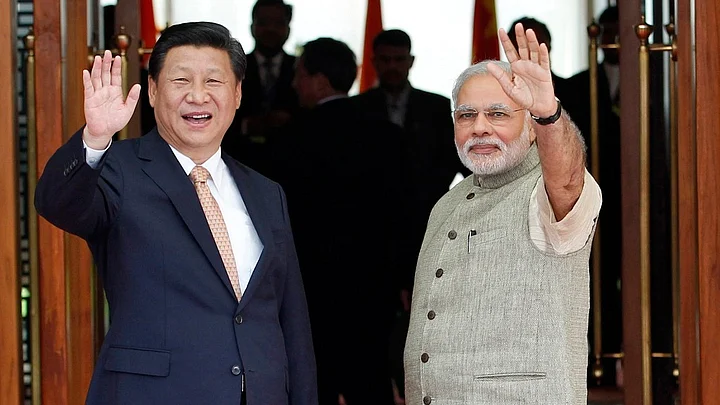The lightning speed with which India and China have agreed to engage at the highest level has generated speculation that when Prime Minister Narendra Modi holds an informal summit with Chinese President Xi Jinping in Wuhan, central China, on 27 and 28 April, something unprecedented is going to happen. Incidentally, I had made a specific mention of the exact dates of Modi's upcoming bilateral visit to China as well as the venue here.
It's time to look at the bigger picture now that PM Modi's visit to China – his fourth in as many years and the second bilaterally – has been officially confirmed. Despite all the hype and the hoopla about the upcoming Wuhan summit, it remains to be seen what kind of concrete deliverables will come up, as the two sides are hoping for a breakthrough. Here's a broad-brush picture I have obtained from a key interlocutor of the Modi government.
On Belt and Road Initiative
PM Modi won't budge on Xi's all-important Belt and Road Initiative (BRI) project. India's stand will be firm and non-negotiable because the China Pakistan Economic Corridor (CPEC), an integral part of the BRI, passes through Pakistan Occupied Kashmir (PoK). There will be no concession from India on this count.
In this election year, PM Modi is not in a position to compromise on the BRI, though he will be keen to listen to any interesting out-of-the-box ideas that the Chinese may proffer. The ball will be in China's court on this issue, as the past Chinese efforts to win over India in this context have failed.
Twin Indian Concerns: NSG and Masood Azhar
From New Delhi's viewpoint, PM Modi would be expecting China to deliver on two most important Indian concerns:
- China lifting its objections to Indian entry into the Nuclear Suppliers Group (NSG) without insisting on Pakistan's entry into the body simultaneously.
- China stopping its support to Jaish-e-Mohamed chief Masood Azhar and vote in line with India at the United Nations for blacklisting him and allowing the international community to proceed against him on charges of aiding and abetting terrorism in India. While India feels buoyant on both these counts, there, however, may be many a slip between the cup and the lip.
How India and China Cooperated in FATF
India wants China to take its stand on Pakistan-centric terror-related Indian concerns to the next level, especially after what China did recently at the FATF.
China withdrew its objection and allowed consensus to go through as the Financial Action Task Force (FATF), an intergovernmental body set up in 1989 to combat money laundering, decided to put Pakistan on the greylist, submitting it to intense scrutiny on terror financing.
This was the first time when China acceded to an Indian cause and left its all-weather friend Pakistan isolated at a global anti-terror forum, thus landing a crippling blow on Pakistan’s financial credentials. Informatively, Pakistan was on the FATF watch list from 2012 to 2015, then only on issues of money laundering. But now the situation has become grimmer for Pakistan, as the country faces increasing opprobrium on the terror issue.
Things are set to take a turn for the worse for Islamabad when the FATF begins process of monitoring Pakistan from June. A likely scenario for Pakistan at the FATF in June will be that the country is put on regular monitoring and all its banking transactions will come under closer global watch, thus debilitating Pakistan’s credibility in global financial transactions.
India worked very closely with China over the FATF proceedings, and eventually pulled off a coup as China left Pakistan high and dry in the FATF at Indian prompt.
The Chinese conduct at FATF earlier this year was in sharp contrast to what Beijing did in November 2017 at the Buenos Aires plenary of the FATF. Then China batted strongly for Pakistan and managed to get Pakistan off the hook. This time, while India worked on China, the United States worked on Pakistan’s two other key friends: Saudi Arabia and Turkey. As per the FATF rules, if three members vote against a proposal, it cannot go through.
Another big agenda before the FATF is action against JeM front Falah-i-Insaaniyat and Lashkar-e-Taiba (LeT) and its front Jamaat-ud-Dawa, which have been transacting financial business with impunity.
On Nirav Modi
Things look rather bleak on the Nirav Modi front, the tainted diamantaire wanted in India for a $1.77 billion bank fraud and who is believed to be in Hong Kong. The Modi government wants the jeweller to be extradited to India. However, this issue is far more complex in terms of international law and India-China political relations.
Though China has assured India that it won't stand in the way and would leave it to Hong Kong, an autonomous region of China, to take whatever decision it wants to take, things are not that easy. The Indian Consul General In Hong Kong has been having this issue on top of his agenda for weeks. Even the Indian ambassador in Beijing, Gautam Bambawale, has visited Hong Kong to push the envelope. However, the sense which has been given to the Indian officials is that it will be a labyrinthine and long-drawn process, presuming that Nirav Modi is still there.
Overall, PM Modi's informal summit with President Xi at Wuhan later this week will be of immense strategic and political terms. The Indian establishment is sensing some kind of a game changer at Wuhan. Fingers crossed!
(Rajeev Sharma is an independent journalist and strategic affairs analyst who tweets@Kishkindha. This is an opinion piece and the views expressed above are the author’s own.The Quint neither endorses nor is responsible for the same)
(The Quint is now on WhatsApp. To receive handpicked stories on topics you care about, subscribe to our WhatsApp services. Just go to TheQuint.com/WhatsApp and hit send)
